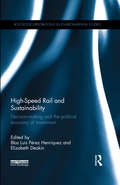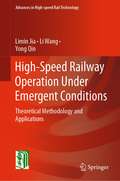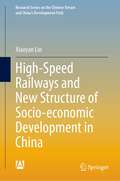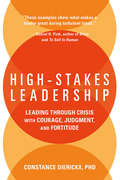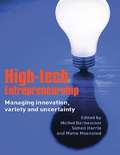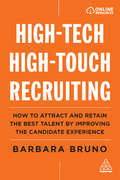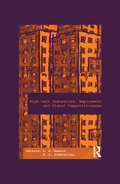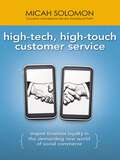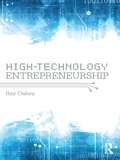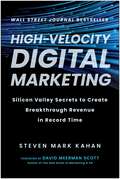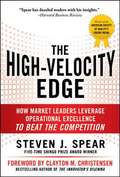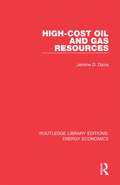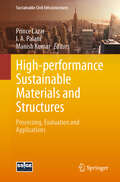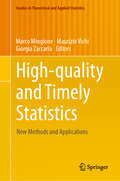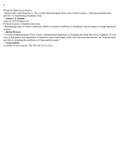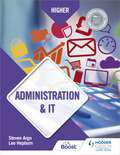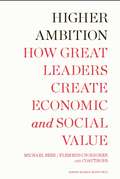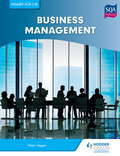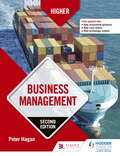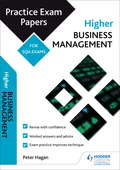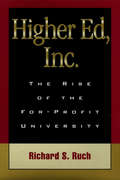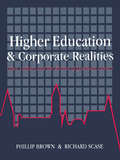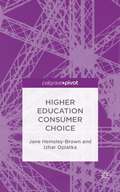- Table View
- List View
High-Speed Rail and Sustainability: Decision-making and the political economy of investment (Routledge Explorations in Environmental Studies)
by Blas Luis Pérez Henríquez Elizabeth DeakinHigh speed rail (HSR) is being touted as a strategic investment for connecting people across regions, while also fostering prosperity and smart urban growth. However, as its popularity increases, its implementation has become contentious with various parties contesting the validity of socioeconomic and environmental objectives put forward as justification for investment. High Speed Rail and Sustainability explores the environmental, economic and social effects of developing a HSR system, presenting new evaluations of the proposed system in California in the US as well as lessons from international experience. Drawing upon the accumulated experience from past HSR system development around the world, leading experts present a diverse set of perspectives as well as diverse contexts of implementation. Assessments of the California case as well as cases from Japan, France, Germany, Italy, Spain, Taiwan, China, and the UK show how governments and stakeholders have bridged the gap between the vision and the realities of connecting metropolitan regions through HSR. This is a valuable resource for academics, researchers and policy-makers in the areas of urban planning, civil engineering, transportation and environmental design.
High-Speed Railway Operation Under Emergent Conditions: Theoretical Methodology and Applications (Advances in High-speed Rail Technology)
by Li Wang Limin Jia Yong QinThis book addresses the current development status of high-speed railways globally and analyzes their operational schemes and practices under emergent conditions. It covers methods and problem-solving philosophy with regard to complexity analysis, capacity evaluation, passenger-flow forecasts, operating strategies, passenger-flow allocation, resource allocation and supporting technologies in the context of serious accidents and adverse environmental influences on train operation and service organization of high-speed railways. The abnormal scenarios, emergent conditions, adverse events and corresponding theoretical and applicational solutions dealing with the train operation both in line and network scale are all from real-world cases related to and designed for Chinese high-speed railway network which is the largest in scale, the highest in complexity and the most difficult in tackling with the complex and diverse climate and geographical environment , and thus makes the book both theoretically rigorous and practically applicable. It not only helps readers consider the train and network interactions from the perspective of complexity science, but also provides them with a philosophical framework and approaches available to construct their own roadmap and problem-solving paradigms in their daily research or management. This book is suitable for researchers, postgraduates and managerial and engineering practitioners in railway-related fields, especially in high-speed railway operation and emergency management.
High-Speed Railways and New Structure of Socio-economic Development in China (Research Series on the Chinese Dream and China’s Development Path)
by Xiaoyan LinThis book systematically expounds the significance of the high-speed railway in China's regional economic and social development. It also contains a large number of case discussions, so that readers can fully understand the development of China's high-speed railway and its role in promoting China's economy. The purpose of this book is to determine whether high-speed railway has important political and strategic significance for China's development, the inherent relationship and mechanism of the high-speed railway together with economic and social development, and how to achieve the high-speed rail and economic and social coordination, as well as sustainable development.
High-Stakes Leadership: Leading Through Crisis with Courage, Judgment, and Fortitude
by Constance DierickxWhat makes some leaders so effective when the stakes are high, while others fall short? Why are some able to not only survive but to lead their organizations to new heights even in risky, fast-changing times? The answer is succinct but multi-layered: such leaders display courage, judgment, and fortitude. High-stakes leadership does not require unnatural powers, nor is it predicated on a dangerous situation. The three signature character traits can be cultivated by anyone at any level in any organization, big or small. Organizational and leadership consultant Constance Dierickx describes high-stakes leadership in a simple, three-part model that illuminates the mindsets, strategies, and tactics leaders must draw upon to make tough decisions, take an unpopular stand, or ignore convention, providing real-world examples across a range of sectors and industries. Dierickx developed her model of high-stakes leadership to help her clients—executives at organizations ranging from start-ups to nonprofits to large, global companies—better define what they need to bring strategy to life. This, she found, is the great gulf in business, the vast space between idea and results. High-Stakes Leadership helps leaders sharpen their ability to: act decisively, with clarity and focus test ideas using reason, and course correct as needed be resolute and inspire others to continue, even in the face of challenges Leading requires the courage to make conscious decisions about what to do, the judgment to separate information from short-term trends, and the fortitude to remain true to oneself and one’s mission. When leaders do these things, they also become teachers, leading their teams by example, often without realizing it. The essential aspects of good leadership endure even as the environment and tactics change. Indeed, courage, judgment, and fortitude are not merely tools for survival, they are the means by which we sculpt the future.
High-Tech Entrepreneurship: Managing Innovation, Variety and Uncertainty
by Simon Harris Michel Bernasconi Mette MoenstedHigh-tech businesses form a crucial part of entrepreneurial activity – in some ways presenting very typical examples of entrepreneurship, yet in some ways representing quite different challenges. The uncertainty in innovation and advanced technology makes it difficult to use conventional economic planning models, and also means that the management skills used in this area must be more responsive to issues of risk, uncertainty and evaluation than in conventional business opportunities. Specifically focusing on the mix of theory and practice needed to accurately inform students, the key topics covered include: uncertainty and innovation entrepreneurial finance marketing technological innovations high-tech incubation management. Including case studies to give practical insights into genuine business examples, this comprehensive book has a distinctly ‘real-world’ focus throughout. Edited by a multi-national team, it draws together leading writers and researchers from across Europe, making it a must-read for all those involved in advanced entrepreneurship with specific interests in high-tech start-ups.
High-Tech High-Touch Recruiting: How to Attract and Retain the Best Talent By Improving the Candidate Experience
by Barbara BrunoDespite global economic conditions, companies are always looking to attract and retain the best talent. Unfortunately, almost 30% of US job seekers leave a new job within the first 30 days. Why? Many new recruiters rely too heavily on high-tech tools to attract candidates and may not have learned the fundamental relationship-building skills that help recruiters ensure that clients and candidates are a good match.High-Tech High-Touch Recruiting provides recruiters with an end-to-end process for recruiting the highest caliber talent who, after they are hired, will become engaged employees. While emphasizing the overall importance of building "high-touch" relationship-building skills, the book outlines how these can be blended successfully with "high-tech" tools such as AI-powered software applications to identify a large pool of qualified job candidates. Once you've identified candidates, the author cautions against the sole use of text and email communication and suggests that recruiters conduct a general interview in order to better ascertain whether a candidate is the best fit for the role. High-Tech High-Touch Recruiting comes with online resources including sample offer letters, recruiting scripts, job requisitions, interview scorecard, a listing of characteristics of best hires and guidelines for a 9-step telephone interview process.
High-Tech Industries, Employment and Global Competitiveness
by S. R. HashimThe process of development in recent times has been characteristically marked by the expanding reach of multinational enterprises, flows of foreign direct investment, unprecedented growth of information and communication technologies (ICT) and knowledge-based industries, and infusion of ICT across the entire spectrum of industries and activities. High-tech knowledge-based industries like information technology, biotechnology, pharmaceuticals and so on have played an important role in the transition of Chinese and Indian economies—the two largest and fastest growing economies.This inter-disciplinary book offers an in-depth understanding of the behaviour of firms in these industries, analysing the strategies they adopt in a globally competitive environment, the role they have played in ushering in the growth revolution in China and India, and the contribution they have made to the nature and growth of employment. This study also dwells upon the emerging nature of scientific and technological developments like nanotechnology, novel materials, spintronics and quantum computers, with the conclusion that in the future, knowledge and technology are going to be the real sources of wealth for nations.
High-Tech, High-Touch Customer Service: Inspire Timeless Loyalty in the Demanding New World of Social Commerce
by Micah SolomonTwitter, smartphones, and self-service kiosks are taking over, and tech-savvy business dealings are no longer an advantage--they’re a requirement. With entertaining humor and inarguable logic, author Micah Solomon offers surefire strategies for success by exploring the timelessness of customer service (i.e., what hasn’t changed), the high-tech tools that could give you a customer service advantage, and the systemic social shifts that are changing your customer’s expectations of the way you do business. You’ll learn inside secrets of wildly successful customer service initiatives, from internet startups to venerable brands, and how to turn casual customers into fervent supporters who will spread the word far and wide--online and off. High-Tech, High-Touch Customer Service does this by teaching readers the six major customer trends and what they mean for business; the eight unbreakable rules for social media customer service; how to effectively address online complainers and saboteurs on Yelp, Twitter, TripAdvisor, and other forums; how to understand and leverage the rising power of self-service; and how to build a company culture that breeds stellar customer service.With special features including lessons from the latest newsworthy customer service blunders, you’ll be equipped to retool old-fashioned customer service and turn time-strapped, screen-addicted, value-savvy, and socially engaged critics into fervent loyal customers who help your business thrive.
High-Technology Entrepreneurship
by Ray OakeyWith the global economy in a precarious position, nurturing new entrepreneurial high-technology firms is likely to comprise a key component of any policy to encourage economic growth, both in developed and developing countries. Recent high-technology ventures – such as retailing in the music industry – have shown how entrepreneurs can radically change, or even replace, the structure of existing industries. High-Technology Entrepreneurship introduces and analyzes all the major aspects of high-technology small-firm formation and growth. Locational and functional aspects of the process, as well as how contexts for development may vary between developed and developing economies are also discussed. Other key topics that are addressed include: how high technology firms originate in theory and practice entrepreneurship theory incubators, science parks and clustering entrepreneurial strategy and finance. Students taking Master's-level courses in entrepreneurship, technology, innovation, academic enterprise and industrial development will find this an essential textbook for completing their studies.
High-Velocity Digital Marketing: Silicon Valley Secrets to Create Breakthrough Revenue in Record Time
by Steven Mark KahanHigh-Velocity Digital Marketing provides B2B sales and marketing teams with a blueprint for quickly accelerating revenue growth 67 percent of B2B buyers no longer prefer to interact with sales representatives when making purchasing decisions. Gathering information online is now the hallmark of the buying process. During his 30+ year career, Steven Mark Kahan has developed a digital marketing blueprint that helps companies quickly increase revenue in brutally competitive markets. In High-Velocity Digital Marketing, he lays out how you can: Set in motion a modern marketing strategy to dramatically increase revenue growth in record time Create content that resonates with your ideal target customers Drive more visitors to your website without paying for ads Build digital demand generation campaigns that quickly deliver more leads, sales pipeline, and revenue Improve your website to convert at least 5 percent of traffic to leads Leverage public relations so it contributes to revenue growth Synchronize your sales and marketing teams in order to close prospects faster and at a higher rate Marketing online is no longer one of the ways to market—it is the way to do marketing. High-Velocity Digital Marketing is your essential, easy-to-implement guide to getting found online, providing the most critical information, and getting your buyers to purchase—fast.
High-Velocity Edge: How Market Leaders Leverage Operational Excellence To Beat The Competition
by Steven J. SpearWhatever kind of company you operate― from technology to finance to healthcare― mastery of these four key capabilities will put you on the fast track to operational excellence, where you will generate faster, better results―using less capital and fewer resources. 1. Build a system of “dynamic discovery” designed to reveal operational problems and weaknesses as they arise. 2. Attack and solve problems when and where they occur, converting weaknesses into strengths. 3. Disseminate knowledge gained from solving local problems throughout the company as a whole. 4. Create managers invested in developing everyone’s capacity to continually innovate and improve.
High-cost Oil and Gas Resources (Routledge Library Editions: Energy Economics)
by Jerome DavisOriginally published in 1981, this book discusses the development of higher cost North Sea gas and oil fields. Starting with the perceived need to develop these higher cost fields, the book focuses on their role in the policy interplay between government and industry. What is high cost, it is argued, is not only economically but also institutionally determined and through a comparative analysis of British and Danish policies with regard to high cost fields the author maintains that the role of institutional factors has been underplayed.
High-performance Sustainable Materials and Structures: Processing, Evaluation and Applications (Sustainable Civil Infrastructures)
by Manish Kumar I. A. Palani Prince LazarThis book underscores the idea of harnessing the sustainable designs and materials in nature and integrating them into the field of engineering to design innovative materials and structures with multifunctional properties targeting defense, automotive, aerospace, electronics, nuclear, healthcare, energy, sports, packaging, etc. to offer improved safety, reliability, performance, durability, sustainability, and functionality. The concept of sustainability involves the understanding of how nature has evolved solutions to various challenges over millions of years and applying these principles to design innovative materials and structures with multifunctional properties. This book provides a thorough examination of the methods and techniques used in developing sustainable materials and structures, highlighting their potential for multifunctional applications. The book delves into the expansion of our understanding in this field, which is accompanied by novel synthesis and processing methods. These methods and techniques incorporate sustainable strategies, to create innovative materials and systems to offer a wide range of properties and functions, making them highly attractive for various applications in different fields of advanced technology. In addition, these materials and structures can be tailored to have specific properties and functions, such as self-healing capabilities, high strength-to-weight ratios, and enhanced energy absorption which are the prime requirements for the researchers looking for lightweight materials and structures.
High-quality and Timely Statistics: New Methods and Applications (Studies in Theoretical and Applied Statistics)
by Maurizio Vichi Marco Mingione Giorgia ZaccariaThis book addresses a wide range of recent methodological aspects, applications and best practices of statistics production. It comprises a selection of peer-reviewed contributions of methodological and applied interest presented at the 4th Conference of European Statistics Stakeholders, CESS 2022, held in Rome, Italy, on October 20-21, 2022. The first part discusses statistical methods with applications to environmental risk assessment, sentinels data, surveillance systems during the Covid-19 pandemic, healthcare risk management, the analysis of regional or structural changes of scale, household distributional accounts, regional rental prices on municipalities, the network topology of the Euro area interbank market, tourism statistics and big data, statistical literacy, and Sustainable Development Goal composite indicators for EU countries. The second part focuses on statistical methodologies for complex data analysis, namely the optimal number of clusters to rank a model-based index, clustering methods for asymmetric data using spectral approaches, a family of parsimonious matrix-variate mixture models for heavy-tailed data, the importance of robust second-stage regressions for financial data, and on perturbation methods. In view of the overarching theme “The European Data Ecosystem for the Statistical Information of the Digital Age” and the importance of statistical data for monitoring the progress of the United Nations’ Sustainable Development Goals, the CESS 2022 meeting provided a forum for discussion on methodologies, results, challenges and best practices among methodologists, producers, and users of European Statistics from academia, the national statistical offices and the institutions of the European Union. Chapter Estimating regional rental prices on LAU 2 municipalities in North Rhine-Westphalia is available open access under a Creative Commons Attribution 4.0 International License via link.springer.com.
High-speed Empire: Chinese Expansion And The Future Of Southeast Asia
by Will DoigLess than a decade ago, China did not have a single high-speed train in service. Today, it owns a network of 14,000 miles of high-speed rail, far more than the rest of the world combined. Now, China is pushing its tracks into Southeast Asia, reviving a century-old colonial fantasy of an imperial railroad stretching to Singapore; and kicking off a key piece of the One Belt One Road initiative, which has a price tag of $1 trillion and, reaches inside the borders of more than 60 countries.
High-velocity Culture Change: A Handbook For Managers
by Price Pritchett Ron PoundHigh-Velocity Culture Change delivers 22 specific guidelines on how to manage your part of the organization for high-velocity culture change. You ll also learn how to avoid the management traps that cause most efforts to fail. This handbook will prepare you for the rigors of the agonizing process that is called culture change. It will also prove how and why the pain is well worth the cost.
Higher Administration & IT
by Steven Argo Lee HepburnTrust our authors - whose students have achieved 100% A-C grades in Higher Admin since 2018 - to build your confidence and boost your grade.Easy to understand and enjoyable to read, this textbook takes you through all the theoretical content and practical skills, with over 60 accompanying digital tasks provided free online.> Learn and remember every topic. Simple explanations ensure that you have strong knowledge of administrative theory. Real-life case studies with differentiated exam-style questions help to check understanding before you move on.> Gain skills for the future. Digital literacy, organisational and management skills are developed throughout the course. The authors also focus on problem-solving skills, to set you up for success in the workplace.> Put skills into practice. Follow clear, step-by-step guides to using spreadsheets, databases, word processing, presentations, emails and e-diary. Apply your skills to over 60 digital tasks, which are available free online.> Prepare for assessment. 'What you should know' checklists and study activities at the end of each chapter are useful revision tools. A practice exam paper and answers are included in the book, and a practice assignment is provided online, with a full marking scheme.
Higher Administration & IT
by Steven Argo Lee HepburnTrust our authors - whose students have achieved 100% A-C grades in Higher Admin since 2018 - to build your confidence and boost your grade.Easy to understand and enjoyable to read, this textbook takes you through all the theoretical content and practical skills, with over 60 accompanying digital tasks provided free online.> Learn and remember every topic. Simple explanations ensure that you have strong knowledge of administrative theory. Real-life case studies with differentiated exam-style questions help to check understanding before you move on.> Gain skills for the future. Digital literacy, organisational and management skills are developed throughout the course. The authors also focus on problem-solving skills, to set you up for success in the workplace.> Put skills into practice. Follow clear, step-by-step guides to using spreadsheets, databases, word processing, presentations, emails and e-diary. Apply your skills to over 60 digital tasks, which are available free online.> Prepare for assessment. 'What you should know' checklists and study activities at the end of each chapter are useful revision tools. A practice exam paper and answers are included in the book, and a practice assignment is provided online, with a full marking scheme.
Higher Ambition
by Michael Beer Flemming Norrgren Russell A. Eisenstat Tobias Fredberg Nathaniel FooteMeeting the new standard for leadership.Higher Ambition is required reading for every leader who refuses to compromise between people and performance. Choosing one or the other may have worked in the past, but it won't work now. As global competition stiffens and businesses face increased public scrutiny and renewed government regulation, leaders must win on all fronts-with their people, their customers, their communities, and their shareholders. In short, they must deliver superior economic and social value. Brimming with powerful stories and thoughtful advice from CEOs themselves, Higher Ambition equips leaders with the practical insights they need to meet this new and higher standard. The authors, an international team of experts from leading business schools and consultancies, offer a unique view into the minds of some of the most successful and insightful leaders of our time: CEOs from vanguard companies around the world that have demonstrated the distinctive ability to do good while also doing well. These organizations are as diverse as Standard Chartered Bank, Infosys, Volvo, Cummins, IKEA, the Tata Group, and Campbell's Soup. Readers will learn the principles and practices these pioneering leaders are using to: Build enduring enterprises that simultaneously solve for people and profits Forge winning strategies that leverage their companies' unique cultural and human capabilities Dramatically raise the aspirations and ambitions of their people Energize and align their diverse global firms Relentlessly upgrade leadership capabilities throughout their organizationsDrawing on the author team's extensive research and in-depth interviews with successful leaders from around the globe, this provocative new book is poised to become a management classic in the tradition of In Search of Excellence and Built to Last.
Higher Business Management for CfE
by Peter HaganThe comprehensive textbook for the new CfE Higher in Business Management.Peter Hagan and Alistair Wylie's Higher and Intermediate 2 Business Management 2nd Edition has been the benchmark textbook resource for for nearly ten years. This new book provides full and authoritative coverage of the newest Higher syllabus offered by SQA. with whom we are working towards endorsement of this title.- fullest coverage of the new CfE Higher- includes Coursework material and advice- highly experienced author, teacher and examiner
Higher Business Management, Second Edition
by Peter HaganExam Board: SQALevel: HigherSubject: BiologyFirst Teaching: August 2018First Exam: June 2019Ensure that students are prepared for every aspect of Higher Biology with the new edition of this popular textbook from James Torrance and his renowned author team, completely updated for the 2018 changes to the SQA Higher Biology syllabus.- Suggested learning activities throughout help to develop students' knowledge and skills including all new case studies, research topics and investigations- Testing your knowledge questions at the end of each chapter provide opportunities to continually assess Knowledge and Understanding, and are particularly useful for homework tasks- 'What you should know' summaries of key facts and concepts provide an excellent source of material for consolidation and revision prior to the SQA examination.- 'Applying Your Knowledge and Skills' sections at the end of each section have been substantially extended to give students extra practice in exam questions and foster the development of Skills of Scientific Experimentation, Investigation and Enquiry
Higher Business Management: Practice Papers for SQA Exams
by Peter HaganPractise for your SQA exams with three specially-commissioned Hodder Gibson Practice Exam Papers.- Practise with model papers written and checked by experienced markers and examiners- Get extra advice with specially-written study-skills guidance sections- Gain vital extra marks and avoid common mistakes with examiner tips
Higher Ed, Inc.: The Rise of the For-Profit University
by Richard S. RuchWinner of the 2002 Alice L. Beeman Research Award for Outstanding Writing about Communications from the Council for Advancement and Support of EducationAmong higher education institutions in the United States, for-profit colleges and universities have steadily captured a larger share of the student market. A recent trend at for-profit institutions is the coupling of job training with accredited academic programs that offer traditional baccalaureate, professional, and graduate degrees. Richard Ruch, with administrative experience in both the nonprofit and for-profit sectors of higher education, takes us inside these new for-profit institutions, describing who teaches there, who enrolls and why, and how the for-profits are managed and by whom. He analyzes their different structures, services, and outlook on higher learning and training, and explains in detail how they make profits from tuition income.In Higher Ed, Inc., Ruch opens up the discussion about for-profit higher education from the perspective of a participant-observer. Focusing on five providers—the Apollo Group (the University of Phoenix); Argosy Education Group (the American Schools of Professional Psychology); DeVry, Inc. (DeVry Institutes of Technology); Education Management Corporation (the Art Institutes International); and Strayer Education (Strayer University)—he conveys for the first time what it feels like to be inside this new kind of American institution. He is also candid about the less attractive aspects of the for-profit colleges, including what those who enroll may give up. As Ruch makes clear, the major for-profit colleges and universities offer a different approach to higher education—one that may be increasingly influential in the future.
Higher Education And Corporate Realities: Class, Culture And The Decline Of Graduate Careers
by Phillip Brown Richard ScaseA new approach to the analysis of cultural reproduction focusing on the impact of economic change. The book demonstrates the reinforcement of cultural stereotypes in recruitment caused by interaction between corporate restructuring and the education system.; This book is intended for academics, postgraduates and advanced undergraduates in sociology with an interest in the sociology of work and the sociology of education as well as researchers and students within human resource management and cultural studies.
Higher Education Consumer Choice
by Izhar Oplatka Jane Hemsley-BrownHigher Education Consumer Choice provides a comprehensive and highly focused critical analysis of research on HE consumer choice behaviour in the UK and around the world. Ideal for students, scholars and marketing practitioners interested in consumer choice and behaviour in higher education markets, the book explores the background and context to research on HE choice including globalization, changing supply and demand, fees and costs, and concerns about social disadvantage. Focusing on personal factors that influence consumer choice, group aspects of consumer behaviour such as cultural and ethnic differences, as well as theoretical and research models, this book is designed to stimulate new debate and criticism of HE consumer choice.
